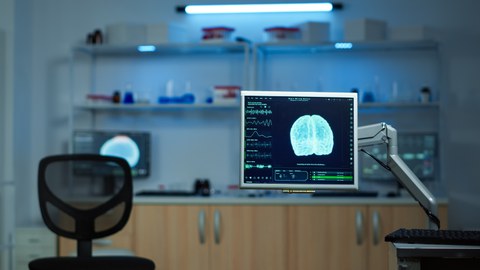Data analysis, methods and modeling in life sciences
An increasingly important aspect of the research work at ZIH is the development of algorithms for modeling the biological processes that occur in cells. When these complex, cooperative processes follow well-established “rules”, the organism grows, develops, and remains healthy. However, when these processes are disturbed or do not otherwise follow the expected pattern, the organism can become sick, suffer damage or die. Understanding the collective phenomena of these systems can provide important insight into the prevention and treatment of diseases.
Instead of focusing on the static components of the cell itself, researchers at ZIH focus on modeling the dynamic processes. Modeling such “cellular automata”, or sets of interactive systems, embodies an important and challenging interface between applied mathematics and biology. Models are created from extensive data and images from laboratory experiments using microorganisms, and cell cultures, and clinical treatment of patients.
While the goal of creating accurate modeling algorithms is to advance biological research, the research on this topic is a multidisciplinary effort drawing on mathematics, physics, and computer science. Thus, the ZIH team works in close collaboration with researchers at Max Planck Institute for the Physics of Complex Systems and the Max Planck Institute for Molecular Cell Biology and Genetics as well as other institutes in Dresden and beyond.
Current Key Topics and Projects
- Standardising the exchange of multicellular models in computational
systems medicine (MulticellML) [more| - Collective motion and swarming [more]
- Stochastic processes, interacting cell systems and cellular automata [more]
- Tumour development [more]
- Endocytosis and systems biology [more]
- Spatio-temporal pattern formation in cells and tissues [more]
- Regeneration [more]
- Bone remodelling [more]
Projects with a focus on method development
- Morpheus – Software infrastructure for multiscale modelling and simulation of multicellular biological systems
- FitMultiCell – Integrated platform for data-driven modelling of multicellular processes
- LEUP – The Least micro Environmental Uncertainty Principle
- EMUNE – Invertible neural networks for an improved understanding of infectious diseases
Projects with a focus on applications in the life sciences
- DEEP-HCC / LiSyM-Cancer – Detailed analysis of the spatial organisation of the development of hepatocellular carcinoma
- MiEDGE – Modelling the behaviour of glioblastoma cells at the tumour margin to predict early recurrence
- subLETHAL - From understanding to rational design of next-generation cancer therapies (EU)

